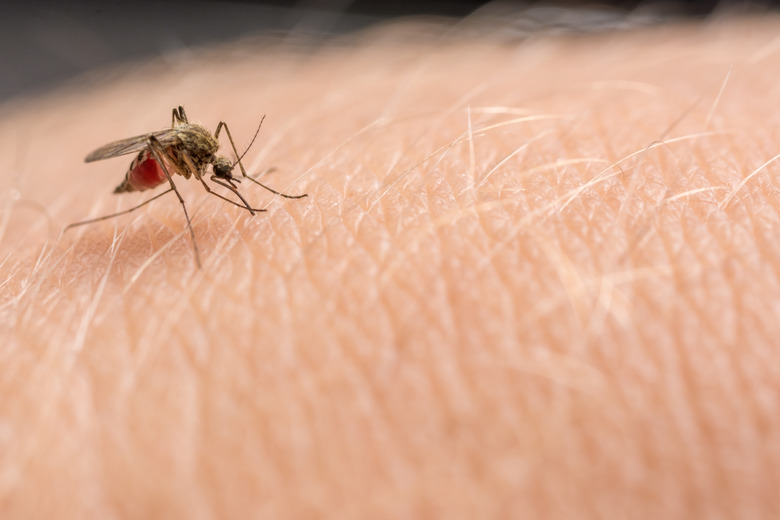What Eats Mosquito Larvae?
Mosquitoes are opportunists. They breed in all available stagnant water sources: clogged and wet gutters; water inside an old tire, a bucket or tin cans; untreated swimming or children's pools; and marshy areas, lakes or ponds. Female mosquitoes often spread disease when they bite, like the West Nile virus, malaria and various forms of encephalitis and meningitis, as well as the heartworm that infests a pet's heart, resulting in the pet's death if left untreated. Each time a female mosquito bites, she sucks blood from the host, which includes any bloodborne diseases the host carries, and spreads it to the next bitten victim. Mosquitoes are the some of the worst summertime pests, but there are animals, fish and other insects that eat mosquitoes, as well as birds that eat mosquitoes to help control the infestation.
TL;DR (Too Long; Didn't Read)
Mosquito predators include bats, birds, a variety of fish, insects like dragonflies and nematodes, and three species of frog tadpoles.
Quick Mosquito Facts
Quick Mosquito
Facts
Not all mosquitoes bite humans; male mosquitoes consume only plant nectar. Some mosquito species rely on only birds, frogs, turtles or horses as food sources and don't bite humans at all. Female mosquitoes can lay over 200 eggs at a time that develop into larvae that live in the water until they hatch. Mosquito eggs don't become larvae until they are fully submerged, which means some eggs can live atop the water until conditions are right for life. Other quick facts include:
- 3,000 mosquito
species exist worldwide
- Some mosquito
eggs can live up to five years
- Mosquitoes fly
about 1 to 1 1/2 miles per hour
- Mosquitoes locate
hosts through infrared radiation, sight and chemically
- Mosquito-provoked
diseases lead to 2 million deaths per year worldwide
What Mosquito Larvae Eat
What Mosquito
Larvae Eat
Mosquito larvae have tubular bodies that periodically surface to breathe air through abdominal siphons. Mosquito larvae eat the bacteria found in stagnant water where these food sources tend to grow. Mosquito larvae eat algae and fungi that grow in ponds without aeration. The larvae go through four stages until they leave the water to become airborne, which occurs over several days once the eggs submerge. Males typically live about 10 days while females can live up to 56 days.
Helpful Mosquito Predators
Helpful Mosquito
Predators
Mosquito predators include pond fish, as well as both insects that eat mosquitoes and birds that eat mosquitoes. Some of the best pond fish for mosquito-larvae control include mosquito fish (Gambusia), which eat the larvae before those larvae turn into adult mosquitoes. Some areas of the country, like Hillsborough County in Florida, offer free mosquito fish at the start of the mosquito season, but you can't use these fish in states where they are not native because they become an invasive species.
As a native freshwater species in Florida, mosquito fish thrive in backyard ponds and require no special feeding if protected from chlorine, pesticides and garden sprays. The best pond fish for eating mosquito larvae also include top-feeding fish like variations of goldfish and koi, guppies, bass, bluegill and even bottom-feeding catfish.
Other mosquito predators include the red-eared slider turtle and even some bats. Insects that eat mosquitoes include dragonflies – known as mosquito hawks – but that's generally when the dragonflies themselves develop during the larvae stage. Other mosquito-eating insects include nematodes and spiders, when they catch a mosquito in their webs. Birds that eat mosquitoes include purple martins, swallows, ducks, geese and terns – birds that frequent ponds – and songbirds that migrate. Bird mosquito predators eat both the larvae and pupae stages of the mosquito as well as the adult stage when it flies.
Frog and Tadpole Mosquito Predators
Frog and Tadpole Mosquito
Predators
Most adult frogs are not known for eating mosquitoes or its larvae. They are often in competition for the same food sources as the mosquito while it grows in a pond. However, the tadpole stages of the giant tree frog, spade foot toad and the green tree frog all thrive on mosquito larvae. Because many tadpole species compete for the same food sources, this may indirectly help to keep mosquito populations down.
Mosquito Prevention
Mosquito Prevention
Besides including at least one of the best pond fish species for getting rid of larvae in your water feature, add a waterfall or small pump to aerate and keep water moving. This effectively cuts down on mosquito larvae development because the larvae require stagnant, non-moving water to thrive. Refresh water containers for animals regularly to ensure mosquitoes don't grow, empty out children's pools and clean all of them before reuse. Larvicides that contain spores or metabolites of the bacterium __Bacillus thuringiensis israelensis__, like the mosquito donuts or dunks you can find at the local hardware store, kill the larvae without harming other beneficial insects or fish.
Cite This Article
MLA
Brenner, Laurie. "What Eats Mosquito Larvae?" sciencing.com, https://www.sciencing.com/eats-mosquito-larvae-8156460/. 22 November 2019.
APA
Brenner, Laurie. (2019, November 22). What Eats Mosquito Larvae?. sciencing.com. Retrieved from https://www.sciencing.com/eats-mosquito-larvae-8156460/
Chicago
Brenner, Laurie. What Eats Mosquito Larvae? last modified March 24, 2022. https://www.sciencing.com/eats-mosquito-larvae-8156460/
